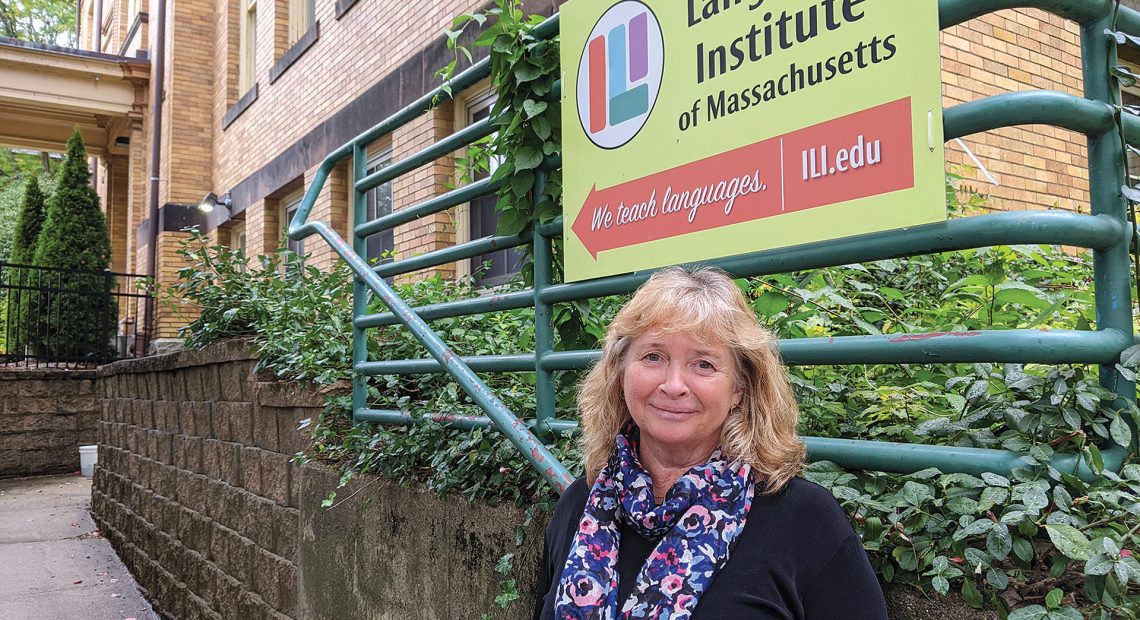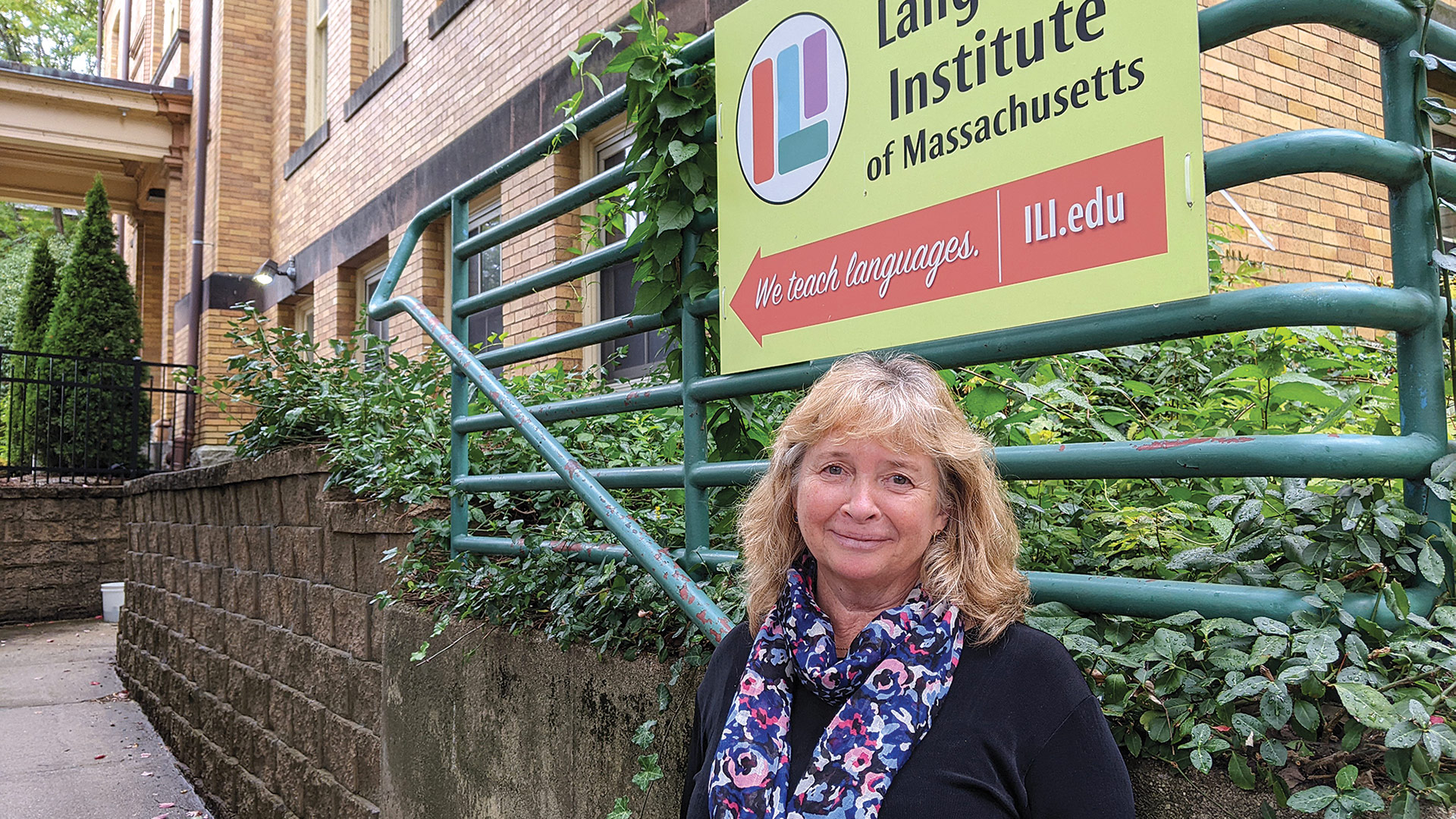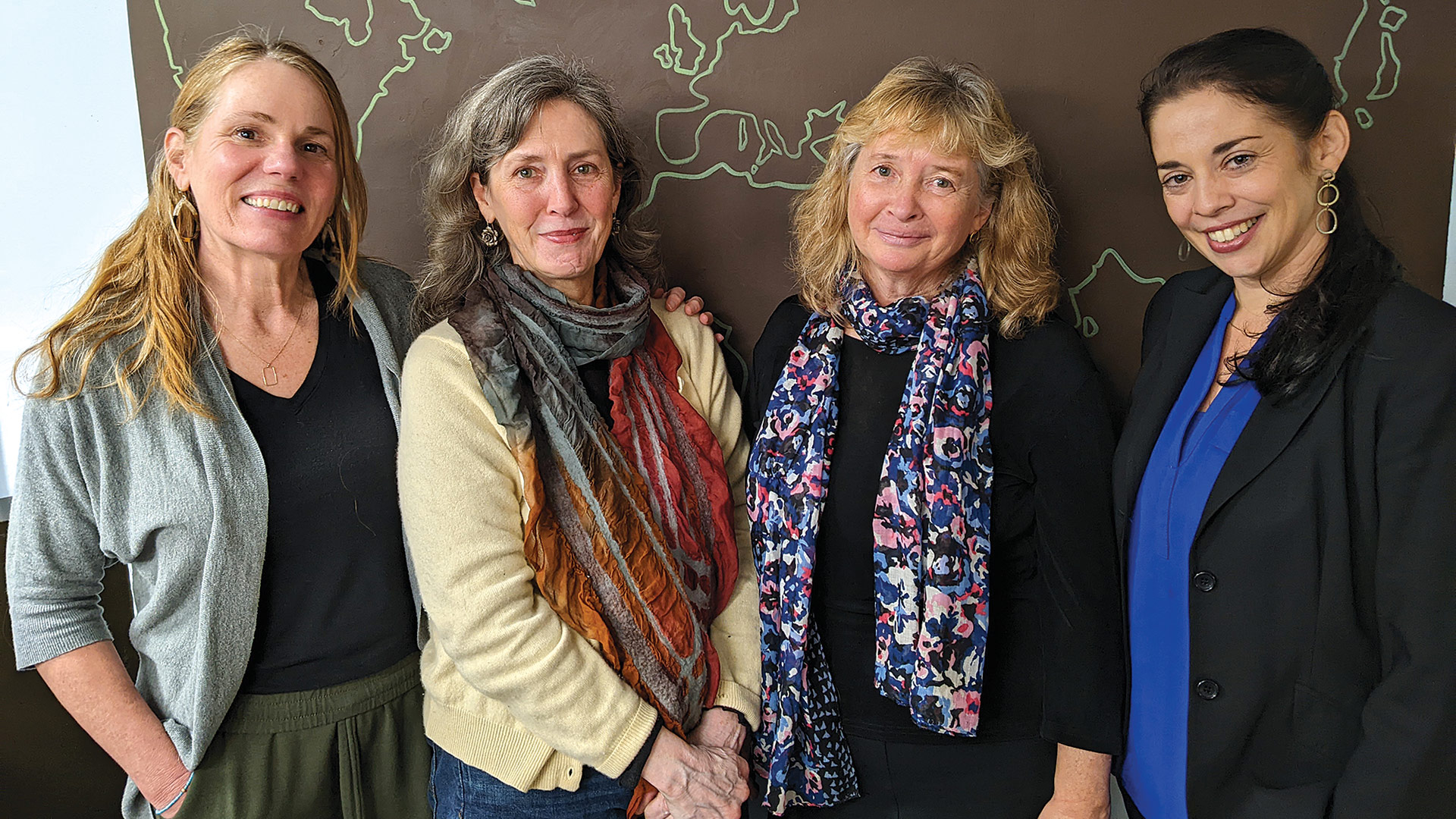
International Language Institute Adapts to New Realities
What’s the Word?

Caroline Gear says the pandemic brought challenges to ILI, but also new ways of connecting with language learners.
A global pandemic hit businesses and nonprofits in different ways. For the International Language Institute of Massachusetts (ILI), which relies on a steady flow of international students, the impact was especially great, as global travel slowed and those connections quickly dried up.
“We went from close to $350,000 a year in our Intensive English programs to $86,000,” said Caroline Gear, the institute’s executive director since 2015. She noted that the CARES Act and other emergency COVID relief, PPP loans, and an employee-retention tax credit helped ILI over the roughest whitewater, and international students are coming back … to an extent.
“I don’t think it’s ever going to come back to pre-pandemic times, but I like to say that we’re emerging anew,” Gear said. “I wouldn’t call it a recovery, because I don’t think we’ll ever recover to those numbers.”
The headwinds include a strong U.S. dollar making it expensive to travel to the States for study, as well as more competition from other countries with programs that teach English and other languages. “Canada opened up much quicker than us after the pandemic, so a lot of students went to the Canadian market and not to the United States. With Brexit, the U.K. lost a lot of international students, too.”
Still, Gear said, “I believe the United States academic culture and expertise and prestige is number one, but we have to make sure that we stay that way and continue to be welcoming. When you’re looking at where our students are coming from, I love the fact that we’re so diverse.”
The numbers bear that out. ILI’s Free English program alone — just one of several major programs at the institute (more on them later) — boasts 120 students from 27 different countries, ranging in age from 17 to 80. In one change from before COVID, five of the six sections are online, though the Intensive English program, because of its immersive aspect, is delivered in-house.
“We’ve all put in extra time because we all believe in this mission of promoting intercultural understanding and diverse communities through high-quality language and teacher training.”
“When the pandemic hit, we thought we would be back in a few months, but we wound up moving all of our classes online,” Gear said, adding that the Intensive English students were the first to return to face-to-face instruction, in August 2021. “Other than that, most of the classes were still meeting online. Our teachers are amazing; they went from emergency teaching to really creating an amazing curriculum online. Online teaching is another revenue stream, which is important for a nonprofit, but I really didn’t want to do it that way.”
But while much of the live instruction has returned to New South Street in Northampton, remote learning will remain part of the plan going forward, which allows ILI to reach students anywhere.
With nine full-time and 23 part-time instructors and staff at the moment, Gear said, “we’ve all put in extra time because we all believe in this mission of promoting intercultural understanding and diverse communities through high-quality language and teacher training.”
An Idea Takes Root
In 1984, Alexis Johnson was a language teacher without a job. But she didn’t lack for vision or passion. So she and another teacher, Janice Rogers, decided to open a language school, one that would meet the needs of myriad clientele, from local non-English speakers aiming to improve their workplace communication to student visa holders preparing for college stateside, to Americans skilled in other languages seeking training to become teachers overseas.
After decades of growth that affirmed her initial vision, Johnson stepped down from the executive director’s chair in 2015 after 31 years, handing the reins to Gear, who has been at the institute since the mid-’80s.

From left, Macey Faiella, director of English Programs; Heather Hall, office manager; Caroline Gear, executive director; and Samira Artur, instructor and program coordinator.
Perhaps the most well-known of ILI’s programs is its World Language program, which teaches a number of languages to students with a variety of goals. Some have a son or daughter marrying someone from another country. Others want to boost their communication skills on the job in an increasingly multi-cultural world. Still others want to advance on the job.
Another popular option is the Free English program, a partially grant-funded initiative that provides free classes for immigrants and refugees looking to improve their English skills for work, college, and their daily lives. English classes meet two evenings a week for a total of six hours.
On the flip side is the Intensive English program, which offers an immersive education for international students, with 21 hours of instruction weekly.
“Maybe their company sends them here, or maybe they know their ability to get a job is improved with a better English level,” Gear said. “The average intensive stay is three months; some take longer. Then they go to university or go home and get a job. Area employers will also send employees here to improve their English.”
Four scholarships — funded by Dean’s Beans; immigration law firm Curran, Berger & Kludt; an anonymous donor, and in honor of a board member’s late uncle, Richard Martin — are offered annually to move four students from the Free English program to Intensive English.
“It’s phenomenal to see what they have to say of the difference between six hours and 21 hours,” Gear said. “It takes about a year of classes in the Free English program to go from one level to another, and now they can do that in three months, so it’s really accelerated learning.”
Meanwhile, students in the University Pathways track of the Intensive English program receive individualized support to transition successfully to a university or college. Instead of cramming for exams or memorizing grammar rules, they practice a set of skills including essay writing, classroom participation, interactive presentations, small-group discussions, team collaboration, academic research, and critical analysis. By focusing less on test taking and more on academic training, they’re better positioned to succeed.
ILI boasts partnerships with more than a dozen colleges and universities, Gear said, that offer these students conditional admission if they meet certain criteria. “They don’t have to take a standardized English test because those schools trust us and know we won’t recommend them unless they are ready to go. We’ve been in this business many years, and we know when people are ready to be successful.”
She added that, “no matter how great your English level is, academic culture in the United States is completely different from their home culture academically. We get them away from rote learning and rote test taking by working on cultural skills, active participation, written and oral production, independent self-direction, peer collaboration, and critical thinking. It’s really helpful for students because they’re so used to one way of teaching for so many years, and we don’t do it that way here.”
ILI’s Workplace Training program offers language courses for companies and employees that bring specialized language training to the workplace. Small businesses can apply to a state fund that pays for this training, Gear said, which makes sense at a time when worker recruitment and retention are such a challenge.
“We all know the situation with finding employees. So if a company finds a great employee but finds their language skills need improvement, working with the state of Massachusetts to have them pay for it is phenomenal.”
As one example, as Gear was giving a tour of ILI to BusinessWest, Office Manager Heather Hall had just gotten off the phone with Flour Bakery in Boston, which employs more than 400 people and was looking for English and Spanish training for many of its staff.
“I’m always learning from our students, and we are making a difference in so many people’s lives. It’s incredibly gratifying to be able to do this work.”
“We’ve also worked with the Holyoke public school system, where we teach the teachers Spanish and the parents English,” Gear said. “It’s not only about learning a language, it’s about learning a culture, navigating systems, and playing an integral role in making sure people feel safe to take risks and get to the next step of their career.”
The sixth — but certainly not least — major component of ILI’s programs is Teacher Training, specifically the SIT TESOL Certificate program, which becomes the graduate’s ticket to teaching language, both in the U.S. and internationally.
Diving In
At the heart of all these programs is a teaching style that, as noted earlier, ditches rote memorization for an immersion approach where constantly putting language into practice, student to student, trumps getting every word perfect.
There’s an element of fun to this immersion, too, Gear said. As one student told her, “we play a lot, but I’m learning a lot.”
Gear and her team are learning, too — about how to navigate a post-COVID world that offers new challenges, but new opportunities as well.
“We’ve diversified more, but we still do the same thing: we teach languages, and we train teachers,” she told BusinessWest, noting that a permanent online presence will be a positive from a revenue and growth perspective.
“It was pandemic-driven because our school runs tuition-based programs that support our partially funded Free English classes. So we need students as well as grants and incredibly generous donors to support our school,” she explained. “We wanted to do online instruction, and now we will always teach online, even as people start to come back to more face-to-face programming.”
After all, she said, “not everyone wants to have classes face to face. There are transportation issues, there are childcare issues, so it’s all about access to education. If we can continue to provide classes to folks virtually and also bring them back in here, that’s a positive.”
At the same time, those in the Teacher Training program are learning to teach online, too, a necessary skill post-COVID.
Coming up on ILI’s annual giving season, when letters of appeal are sent to potential supporters, Gear noted that “it’s not just one thing that runs this school; it’s a variety of revenue streams — tuition-based programs, generous community supporters, grant foundations that support us … and love.”
She’s also hoping for some of the ARPA money being distributed by the city of Northampton, which would be put to use upgrading the institute’s space and air flow as part of a three-phase improvement plan.
But mostly, she’s adapting — and appreciating the impact the International Language Institute has on individuals, families, businesses, and communities both locally and around the world.
“I love my job. I love who I get to work with, what we do to help people to the next step,” she said. “I’m always learning from our students, and we are making a difference in so many people’s lives. It’s incredibly gratifying to be able to do this work. It’s not been easy through the pandemic, but we’ve learned to embrace the uncertainty and look for opportunities.”
Joseph Bednar can be reached at [email protected]




